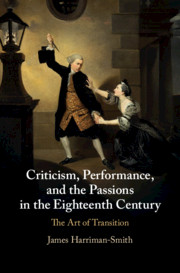Book contents
- Criticism, Performance, and the Passions in the Eighteenth Century
- Criticism, Performance, and the Passions in the Eighteenth Century
- Copyright page
- Dedication
- Contents
- Illustrations
- Acknowledgements
- Note on Style
- Introduction
- Chapter 1 Dramatic Transition
- Chapter 2 Zara
- Chapter 3 Odes
- Chapter 4 King Lear
- Chapter 5 Dramatic Character
- Coda
- Notes
- Bibliography
- Index
Chapter 5 - Dramatic Character
Published online by Cambridge University Press: 02 March 2021
- Criticism, Performance, and the Passions in the Eighteenth Century
- Criticism, Performance, and the Passions in the Eighteenth Century
- Copyright page
- Dedication
- Contents
- Illustrations
- Acknowledgements
- Note on Style
- Introduction
- Chapter 1 Dramatic Transition
- Chapter 2 Zara
- Chapter 3 Odes
- Chapter 4 King Lear
- Chapter 5 Dramatic Character
- Coda
- Notes
- Bibliography
- Index
Summary
This chapter begins by demonstrating that an attention to transition was a key element in some prominent literary critical writing of the later eighteenth century. I then argue that, within such writing, the understanding of transition evolves from that explored in my earlier chapters. Borrowing a term that Elizabeth Montagu, William Richardson, and their contemporaries make frequent use of, one might call this evolution a shift from dramatic transition to ‘dramatic character’. Montagu does this as she argues for the moral impact of Shakespeare’s incessantly enthralling dramatic characters, and Richardson when he claims that Shakespeare’s dramatic characters are such perfect imitations of life that their passions and transitions might serve as the subjects of philosophical enquiry into human nature. I use Maurice Morgann’s Essay on the Dramatic Character of Falstaff (1777) and David Hume's Treatise of Human Nature (1740) to illuminate the tensions inherent in such a critical standpoint, as efforts to explain moments of spectacular dramatic transition in terms of a character's stable identity risk minimising the spectacle that invited such explanation in the first place.
Keywords
- Type
- Chapter
- Information
- Criticism, Performance, and the Passions in the Eighteenth CenturyThe Art of Transition, pp. 153 - 183Publisher: Cambridge University PressPrint publication year: 2021

